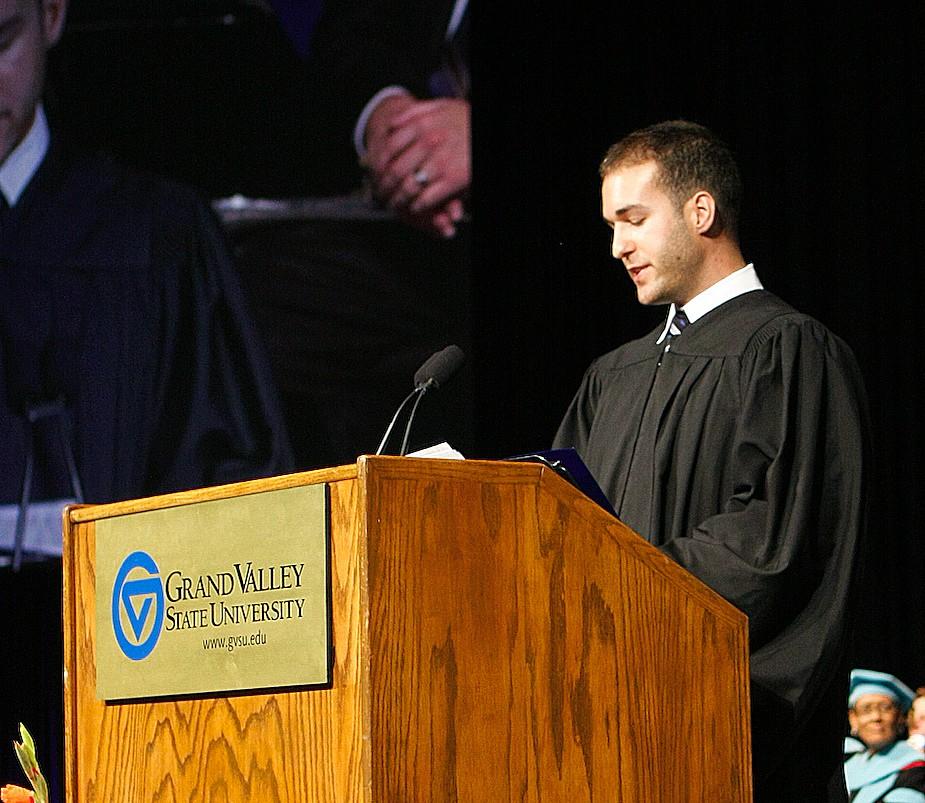Student Senate explores graduate governing body

GVL Archive / Eric Coulter Student Senate President Jarrett Martus
Apr 21, 2011
While the enrollment of graduate students climbed to 1,500 for the 2010-2011 academic year, the Student Senate at Grand Valley State University is thinking up ways to make is student-governed body just a little more inclusive.
“Something [North Central Accreditation] recognized is an issue is that graduate students aren’t being represented fairly,” said Student Senate President Jarrett Martus.
Martus said although Student Senate is open to all students, the current structure may not be the most supportive for many graduate students in terms of time commitments and scheduling. With graduate students expressing more of an interest in student governance than in the past, Martus and a small team of cabinet members and faculty are in the preliminary stages of structuring a graduate addition to Student Senate’s current structure.
“We wanted to keep something that is one group – one governing body – for all the university and keep the inclusiveness. That’s one of Grand Valley’s key things,” Martus said.
Provided the current Student Senate passes Martus’ proposal, there would be an undergraduate and graduate body that would both report to an executive committee that would govern them each. Representation in the executive committee would fluctuate from year to year but remain proportionate to the student population.
The executive committee would also have a president, who Martus said ideally would be responsible for taking the main allocation of the student life fund and disbursing it among the graduate and undergraduate bodies. The president would also as hold responsibility to make sure students fill all of the different standing committees around the university.
The undergraduate side of the student body would look the same way as Student Senate does now, and the addition of the graduate body would give those students more power and authority in university affairs.
Martus said the senators are still working out the balance of power – trying to give more to graduate students without hurting the current structure of the Student Senate as it stands.
“I don’t want to see it turn into a graduate student/undergraduate fight,” he said. “I don’t think it will.”
Jeffrey Potteiger, dean of Graduate Studies, said in his experience, the playing field seems pretty peaceful thus far.
“The opportunities that I’ve had to work with Student Senate right now have been extremely positive,” Potteiger said. “ … I think they’re very open and receptive to hearing what graduate students have to say. Likewise, I think the graduate students are very interested in getting involved and working with the undergraduate student population to make GVSU a better place for everyone, to be much more inclusive in what we do.”
Potteiger, who will serve on the committee with Martus, said he thinks graduate students will bring a unique perspective to the Student Senate since they have already been undergraduates and have spent more time living life in the real world.
“I think they bring that perspective to the university environment,” he said. “Looking at it the other way, most undergraduate students have not been undergraduate students. They’ve not had full time jobs, and most don’t have families. And so the issues and the challenges that are central in graduate students – being involved in school and being at the university – I think can be brought to Student Senate through the eyes of the graduate students.”
Martus said over the next stages of development, the Student Senate plans to have a give and take moment when committee members try to figure out “what’s best for Grand Valley and not what’s best for just the student groups.”
Although Martus will not serve in the Student Senate body next fall, he will stay to co-chair the committee with assistant vice president for Academic Affairs Nancy Giardina because he felt the additional commitment would be too much for next year’s president in light of other responsibilities.
If all goes smoothly, Martus said the newly-redesigned Student Senate will become active in the fall of 2012.
“I think it’s important for us to really try to work towards having everyone, or at least as many people as possible, having a voice at the table in how the institution should run from a student perspective,” Potteiger said. “So if we accomplish that, I think that’s a good thing.”

























